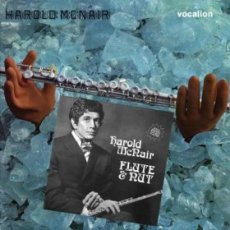
Daily Dose Of Jazz…
Harold McNair was born on November 5, 1931 in Kingston, Jamaica and started his instrumental training at the Alpha Boys School. Recording and playing mostly Caribbean music styles in the Bahamas, the first decade of his career he was known as “Little G”. During this time he sang and played both alto and tenor saxophones.
McNair played a calypso singer in the 1958 film Island Women and by 1960 he was in Miami recording his first album as a leader “Bahama Bash”, with a mixture of jazz and calypso numbers. It was around this time that he began playing the flute, which would eventually become his signature instrument. Though he took a few lessons in New York, he was largely self-taught.
Departing for Europe later in 1960 Harold toured with Quincy Jones, worked on film and TV scores in Paris, then settled in London gaining a formidable reputation and leading a regular gig at Ronnie Scott’s nightclub
Drawing the admiration of bassist Charles Mingus, in London to shoot the 1961 motion picture All Night Long, McNair became a member of the rehearsal quartet and appeared on the soundtrack on the now famous Mingus composition “Peggy’s Blue Skylight”.
A brief return to The Bahamas produced his first all jazz album “Up in the Air with Harold McNair”, then back to permanent London residence to release his first UK album of hard swinging standards as a leader, “Affectionate Fink” on Island Records with Ornette Coleman.
He signed with RCA and released his most famous composition “The Hipster” in 1968 that has become a playlist fixture. He continued to perform and record into 1971 working and recording with the likes of Philly Joe Jones, Eddie “Lockjaw” Davis, Blossom Dearie, Ginger Baker’s Air Force big band and John Cameron as both leader and sideman.
Harold McNair, flautist, alto and tenor saxophonist whose unique phrasing on the flute in particular also led to great demand for his services among non-jazz musicians, passed away of lung cancer in Maida Vale, North London on March 7, 1971 at age 39.
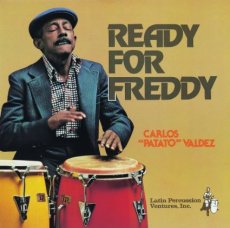
Daily Dose Of Jazz…
Carlos “Patato” Valdes was born on November 4, 1926 in Cuba and learned to play the conga in his native land. Moving to New York in 1954 he began playing around the city working with Willie Bobo in Harlem. Known by his nickname “Patato”, he invented and patented the tunable conga drum in the late Forties that revolutionized use of the instrument as earlier drums only had nailed heads.
Since the 1950s Patato is among the Congueros that were in highest demand in the Latin Music and jazz world. He played, toured and recorded together with singer Miguelito Valdes, Perez Prado, Tito Puente, Machito, Herbie Mann, Cachao Lopez, Cal Tjader, Kenny Dorham, Art Blakey and Elvin Jones among others. He also worked in the bands of and toured Europe with Dizzy Gillespie, Quincy Jones and Mario Bauza.
Patato acted in and composed the title song of The Bill Cosby Show, contributed to the soundtrack of the film The Mambo Kings Play Songs of Love, gave Bridget Bardot mambo lessons in the film “And God Created Woman, led his own band Afrojazzia and toured Europe once again and mastered to the delight of his audiences, the art of actually dancing atop his congas during his performances.
For over 60 years Valdes demonstrated in his conga playing how a musician could combine technical skill with superb showmanship, fusing melody and rhythm, and understanding the rhythm is rooted in dancing. Carlos “Patato” Valdes, whose spontaneity and charm enabled him to bring together audiences of varied backgrounds and cultures to the Afro-Cuban rhythms and who Tito Puente once referred to as “the greatest conguero alive today”, passed away on December 4, 2007 in New York City.
More Posts: conga
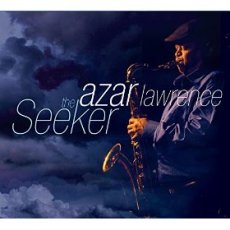
Daily Dose Of Jazz…
Azar Lawrence was born in Los Angeles, November 3, 1953 and started playing drums at the age of three. By five he began formal studies on piano and violin, encouraged by his mother, who was an elementary school music teacher. At 11, while performing with the USC Junior Orchestra, he became enamored with the sound of the alto saxophone and his father, a stalwart supporter of his son’s musical endeavors, promptly bought him a Selmer and his fate was sealed.
Playing in the Dorsey High Jazz Band, Lawrence met Herbert Baker, a piano prodigy who was playing with Freddie Hubbard. It was Baker who first introduced Lawrence to piano master Horace Tapscott, an important mentor who helped shape Lawrence’s musical philosophy and prepared him for the formidable task of playing with Elvin Jones.
Becoming a sideman with McCoy Tyner, replacing John Coltrane, he also worked with Miles Davis, Freddie Hubbard and Woody Shaw, released his album Bridge to the New Age in 1974 with Jean Carn, Julian Priester, Hadley Caliman and Ndugu Chancler followed by his sophomore project Summer Solstice working with Ron Carter and Albert Dailey.
He has release five albums as a leader and went on to work with Henry Franklin, Gene Harris, Patrice Rushen, Phyllis Hyman, Earth Wind & Fire, Lee Ritenour, Paul Jackson, Stanley Turrentine and Harvey Mason.
However, success has its monkey and Lawrence fell victim to drug abuse and all but disappeared from the jazz scene working only occasionally with Billy Higgins when he could borrow a saxophone. He eventually pulled himself into sobriety and embraced a new period of creativity releasing Mystic Journey in 2010 and the tenor saxophonist continues to perform.
More Posts: saxophone
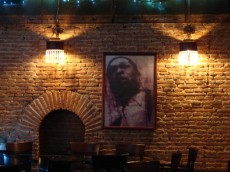
The Jazz Voyager
Porta Jazz: Sirok Sokak, Bitola, Macedonia / Telephone: ++38947236615 / Contact: Vlatko Hristovski-Dado / Situated on the main street called Sirok Sokak, simply translated as Wide Street, I will finally arrive at my destination, Porta Jazz. It is a really good jazz bar that has a nice atmosphere and superb music. Wanting to hear every note the musicians are offering I will arrive when the doors open at 9:00pm and take in a couple of sets before the 1:00am close. I will see if Porta Jazz really does provide their claim of a relaxed and friendly atmosphere for enjoying the best international and local jazz. Macedonia is old enough to be placed in the annals of antiquity around the year 356 BC that Philip II, father of Alexander The Great established.
Next Stop: Brazil! Jet-setting around the globe is taking me back below the equator to the country I love – Brazil. Having driven back to Skopje I jump on the plane at 3:50pm and three stops and nearly 22 hours later i arrive in Curitiba at 10:39am. Time to get to the hotel, relax for a while before heading out into the city and enjoying the people , the food and the music that’s always in the streets. I’ll have a leisurely dinner before heading out for some good music.
Sponsored By
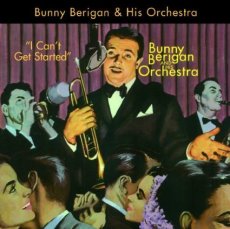
Daily Dose Of Jazz…
Bunny Berigan was born Rowland Bernard Berigan on November 2, 1908 in Hilbert, Wisconsin. Raised in Fort Lake the child prodigy learned violin and trumpet at an early age and played in local orchestras by his late teens. He joined the Hal Kemp Orchestra in mid 1930 recording his first trumpet solos and touring England. Upon his return in ’31 he was a sought after studio musician and recorded his first vocal “At Your Command”, then worked with the bands of Paul Whiteman and Abe Lyman by 1934.
He continued freelancing in the recording and radio studios, most notably with the Dorsey Brothers and on Glenn Miller’s earliest recording date as a leader in 1935, an association that graduated him to fame in his own right when he joined Benny Goodman’s re-formed band that included drummer Gene Krupa. The band made the legendary tour that ended with their unexpectedly headline-making stand at the Palomar Ballroom in Los Angeles, California, which has often been credited with the “formal” launch of the swing era.
Berigan went on to work with Tommy Dorsey recording one of his signature solos on the hit “Marie”, recorded under his own name his biggest hit “I Can’t Get Started”, led his own big band for three years that included Buddy Rich and Ray Conniff. He was a fixture on CBS Radio’s coast-to-coast broadcasts of Saturday Night Swing Club from 1937 to 1940, that helped further popularize jazz as the swing era climbed to its peak.
Already a heavy drinker and the band failing financially, Bunny drinking took a toll suffering pneumonia and then stricken with cirrhosis and ignoring his doctor’s advice, trumpeter, composer and bandleader Bunny Berigan, who modeled his playing in part on Louis Armstrong’s style lost his battle with alcoholism passing away of a massive hemorrhage on June 2, 1942 at age 33.
More Posts: trumpet



